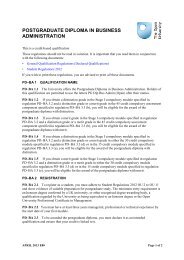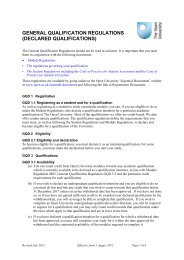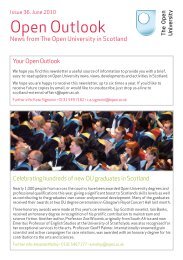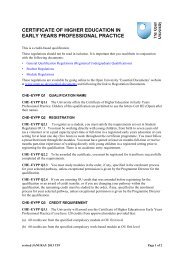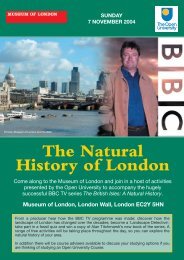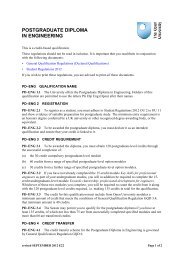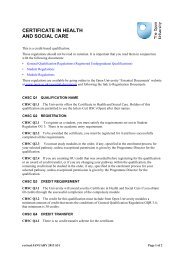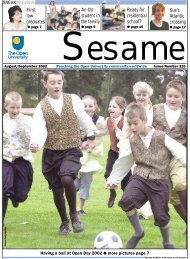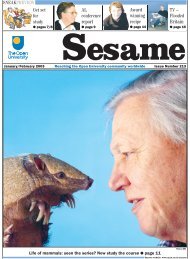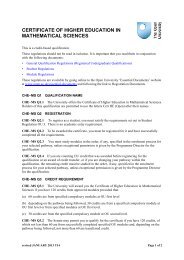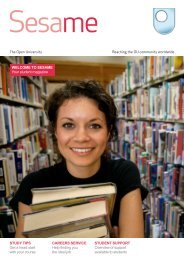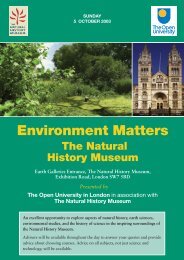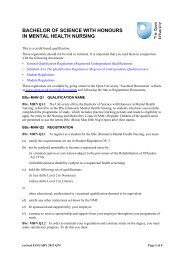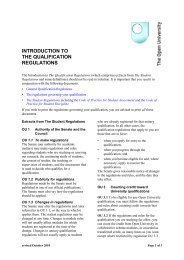Sesame April/May 2002 - The Open University
Sesame April/May 2002 - The Open University
Sesame April/May 2002 - The Open University
You also want an ePaper? Increase the reach of your titles
YUMPU automatically turns print PDFs into web optimized ePapers that Google loves.
Issue 208 <strong>April</strong>/<strong>May</strong> <strong>2002</strong> <strong>Sesame</strong> 9Three new ways of writing<strong>The</strong> first short courses from the arts faculty are likely to have awide appeal to both new and existing students who want toexplore an interest or improve their skills.A171 Start writing for the internet, A172 Start writing essays a n dA173 Start writing family history focus on some of the university’smost requested areas and should be available from 2003.Though details are subject to change, all three will be worth 10 pointsand will involve around 72 hours of study over a 12-week period.Start writing for the internet is designed to help students respondeffectively to the growing need to be able to communicate online. Itwill cover, for instance, the special demands the internet makesof us as writers, netiquette, reading from the screen and frompaper, writing emails, online discussions, how to avoid beingmisinterpreted and legal considerations. <strong>The</strong> second half of the coursefocuses on writing for web pages, underpinned by exercises andactivities which demonstrate that communicating effectively meansbeing sensitive to the reader, the medium and the genre in whichyou’re writing.Start writing essays is intended for those returning to or new tostudy who are frightened of writing essays. It aims to build confidencethrough a mix of strengths and weaknesses diagnosis, structuredI n f e c t i o u sd i s e a s e sex p l o r e dAIDS is on the increase, TB hasreappeared in our schools and hospitalwards now regularly close to prevent thespread of infection.But why do such diseases travel sorapidly, why do they affect some populationsmore than others, why are new infectious diseasesappearing and how can they be controlled?New from the science faculty for 2003,S320 Infectious diseases looks at howthe causes and control of such diseases canbe understood only through a study ofbiological information in a social context.Using a wide range of case studies, it alsoexamines the effectiveness of strategies usedto combat disease, from vaccination and drugsto public health measures.One of the course’s aims is to helpstudents develop the skills to undertakeresearch of infectious disease and a keyelement of S320 is an emphasis on projectwork, leading to a study of an infectiousdisease of their choice.P s ych o l o g yfor th e21 st centuryA distinctive vision of psychology inthe 21st century is the aim ofthe new course DSE212 E x p l o r i n gpsychology.<strong>The</strong> course is designed to helpstudents understand the range of theoriesand perspectives that psychologistsuse and the research that they do. Italso offers an opportunity to examinethe ways in which psychologicaltheories and research are applied, bothin everyday life and by professionalpsychologists.A particularly exciting feature ofthe course is its emphasis on understandingeveryday life. This coursewill help to prepare students forother OU psychology courses andhelp them to develop the researchand ICT skills they need in the newmillennium.If the stakes were high 10 years agowhen the first global conference onsustainability was held in Rio, how muchhigher are they, post September 11, asnations prepare to meet again in Augustin Johannesburg?Against a background of aid agenciesmoving into Afghanistan, the Middle Eastmoving further from peace, whole swathes ofthe world experiencing the devastating effectsof climate change, and technology widening thegap between haves and have-nots, there couldscarcely be a more timely course than the OU’sU213 International development: challengesfor a world in transition.Given the scale of that transition over the lastdecade, the toughest challenge of all for thecourse team must have been deciding what toleave out. U213 divides neatly into two sections:the first introducing the main issues andputting them in their historical context; the secondoffering a chance to explore three from fiv ethemes in greater depth – sustainability, poverty,technology and knowledge, displacement,transitions; all of it underpinned by the themeof inequality, which is at the root of the eventswhich have shaken our world over the lastdecade.Its other critical theme is that internationaldevelopment is not about what Oxfam orMédecins Sans Frontières is doing in Africa butabout what all of us who share this planet doexercises, individual feedback and practice. <strong>The</strong>mes include effectiveuse of English, essay planning, making the case and editing your ownwriting. A final block on improving your writing looks atwriting in different genres – including the exam essay – as well asclassic mistakes and how to avoid them.Start writing family history takes students beyond simplygathering information about the past to writing history. Though its focusis on family history, as the area most accessible to students throughphotographs and people’s stories, the course will also demonstrate thebasic principles of historical study: identifying sources, interpretingevidence and selecting examples. Key topics in this fascinating courseinclude using official documents such as the Census, wills and medicalrecords, first person narratives such as letters and diaries, visualevidence and an exploration of oral history.For information on featured courses and a widerange of other new courses visit the OU’s websiteat: www.open.ac.uk or phone 01908 653231.Second year forstudy withFe r n U n i v e r s i t ä t<strong>The</strong> OU and its German equivalent,the FernUniversität, are now into thesecond year of a pilot scheme thatgives students from both institutionsthe opportunity to study each other’scourses.“We are looking for another group of OUstudents with good German to take thecourse on offer from the FernUni aspart of their German Studies programme,”explained Dr Liz Manning, assistantdirector, OU in the North. “<strong>The</strong>ir coursefees will be waived and successful completionof the course will contribute 30points towards a number of OU nameddegrees.” Owing to high interest in thescheme last year, the FernUni is willingto fund up to 25 OU students. “<strong>The</strong> course,which comprises three modules onGerman history and politics, will begin inthe autumn and finish in the March, so itdovetails quite nicely with the OU year,”said Liz.For more information, contact LizManning at the Regional Centre inNewcastle on +44 (0191) 284 1611.Registration for the scheme will be on afirst-come, first-served basis.Bold course seeks tore - examine deve l o p m e n tevery day of our lives, and the choices we make.Helen Yanacopolous (co-ordinator of U213’stechnology and knowledge theme) said:“What this course does is challenge notions ofwhat development is, the notion that it is‘out there’, which is why we took ‘thirdworld’ out of the title. International developmentmeans we in the north and west are partof it.”Course team co-chair Gordon Wilson echoed:“Social justice and global citizenship have beenthe driving forces behind this course.”Further proof of the OU’s determination to‘reframe development’ is the bold decision tomake U213 one of two core courses in the university’snew International Studies degree. “Tothe best of my knowledge there is no other UKinstitution which does this,” said SimonBromley, chair of the degree board. “Most focuson the rather small bit of the world which hasthe wealth.“In putting the concerns of the majority ofthe world’s population at the core of our programmewe may get our students to think aboutthe international in new ways and open themup to listening to a diversity of voices.”Both course and degree programme appearat the same time as a new InternationalDevelopment Centre which will act as a focusfor cross-faculty research and teachingpartnerships and raise the profile of internationalstudies at the OU.V C ’ sV I E WProfessorBrendaGourleyDon’t justwatch theworld go byThis issue of S e s a m efeatures two newcourses with an international focusand stories from different parts of theworld. <strong>The</strong>se serve to remind us of whata cosmopolitan community the <strong>Open</strong><strong>University</strong> is and how very internationalhigher education has become.Conventional universities seek to be moreinternational so their students will have anappreciation of other cultures and values.This appreciation must be the mark of aneducated person but it is increasingly alsothe mark of a more employable person. Moreand more organisations understand thatdiversity is important to the quality of theiroperations. As their markets become moreglobalised and their reach to other countriesmore important to their business success,they appreciate the benefits of understandingcultures other than their own. Conventionaluniversities enthusiastically recruitinternational students and work to make thecampus experience one where students cometo encounter other cultures.<strong>The</strong> OU is of course not a conventionaluniversity – anything but! It can howeverseek for its students those same qualities. Itcan give them student experiences in theteaching and learning domain. It can provideopportunities to meet other students althoughit cannot engineer the composition of thegroups that students choose to join. It can givean opportunity to participate in chat roomsand virtual groups that span many countriesand many cultures. Indeed the studentorganisation itself has provided students witha wonderful facility for online conversationand the participation rate is quite remarkable– and growing.I would encourage students to grasp theopportunity to make friends and colleaguesacross countries and cultures by whatevermeans they have at their disposal. Not leastof these opportunities is enabling them tolearn another language. This must be one ofthe most direct and effective ways to acquirean insight into another culture. And who wouldhave thought it would be possible to teach thisat a distance in the way that the OU does? Thisis one more barrier that the OU has breachedand several languages are being taught withthe help of all the various media forms we nowhave at our disposal.<strong>The</strong>re is another and perhaps moreimportant reason to grasp whateveropportunities we have to become more awareand sensitive to other cultures. Nothing couldhave made it more obvious than the ghastlyevents of September 11. We live in a worldwhere we are increasingly interdependent.No society is cocooned from another. <strong>The</strong> richwestern societies might have thought theycould put up ‘golden barricades’ but no moredramatic breach could have been imaginedthan the crash into the World Trade Centre.As tides of refugees fall upon the shores of therich nations of the world, as the search forbasic human rights becomes ever more urgentand important to us all, we need to tryto understand what it means to be a globalcitizen.I would hope that the OU encourages andindeed, makes it possible for its students toengage in this quest and also to understandits importance. That it is likely to havepersonal and career benefits is, in a way, abonus.



